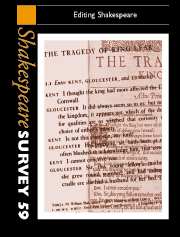Book contents
- Frontmatter
- Editing Shakespeare’s Plays in the Twentieth Century
- Crisis in Editing?
- On Being a General Editor
- Altering the Letter of Twelfth Night: ‘Some are born great’ and the Missing Signature
- ‘A Thousand Shylocks’: Orson Welles and The Merchant of Venice
- The Date and Authorship of Hand D’s Contribution to Sir Thomas More: Evidence from ‘Literature Online’
- Ferdinand’s Wife and Prospero’s Wise
- Editing Stefano’s Book
- Manuscript, Print and the Authentic Shakespeare: The Ireland Forgeries Again
- The Author, the Editor and the Translator: William Shakespeare, Alexander Chalmers and Sándor Petofi or the Nature of a Romantic Edition
- Women Edit Shakespeare
- The Shakespeare Edition in Industrial Capitalism
- Print and Electronic Editions Inspired by the New Variorum Hamlet Project
- The Evolution of Online Editing: Where Will it End?
- The Director as Shakespeare Editor
- The Editor as Translator
- Performance Editions, Editing and Editors
- Editing Collaborative Drama
- Will in the Universe: Shakespeare’s Sonnets, Plato’s Symposium, Alchemy and Renaissance Neoplatonism
- Giants and Enemies of God: The Relationship between Caliban and Prospero from the Perspective of Insular Literary Tradition
- Shakespeare’s Ages
- Who Wrote William Basse’s ‘Elegy on Shakespeare’?: Rediscovering a Poem Lost from the Donne Canon
- ‘Sometime a Paradox’: Shakespeare, Diderot and the Problem of Character
- Shakespeare Performances in England, 2005
- Professional Shakespeare Productions in the British Isles, January–December 2004
- The Year's Contributions to Shakespearian Study 1 Critical Studies
- 2 Shakespeare in Performance
- 3 Editions and Textual Studies
- Index
Women Edit Shakespeare
Published online by Cambridge University Press: 28 March 2007
- Frontmatter
- Editing Shakespeare’s Plays in the Twentieth Century
- Crisis in Editing?
- On Being a General Editor
- Altering the Letter of Twelfth Night: ‘Some are born great’ and the Missing Signature
- ‘A Thousand Shylocks’: Orson Welles and The Merchant of Venice
- The Date and Authorship of Hand D’s Contribution to Sir Thomas More: Evidence from ‘Literature Online’
- Ferdinand’s Wife and Prospero’s Wise
- Editing Stefano’s Book
- Manuscript, Print and the Authentic Shakespeare: The Ireland Forgeries Again
- The Author, the Editor and the Translator: William Shakespeare, Alexander Chalmers and Sándor Petofi or the Nature of a Romantic Edition
- Women Edit Shakespeare
- The Shakespeare Edition in Industrial Capitalism
- Print and Electronic Editions Inspired by the New Variorum Hamlet Project
- The Evolution of Online Editing: Where Will it End?
- The Director as Shakespeare Editor
- The Editor as Translator
- Performance Editions, Editing and Editors
- Editing Collaborative Drama
- Will in the Universe: Shakespeare’s Sonnets, Plato’s Symposium, Alchemy and Renaissance Neoplatonism
- Giants and Enemies of God: The Relationship between Caliban and Prospero from the Perspective of Insular Literary Tradition
- Shakespeare’s Ages
- Who Wrote William Basse’s ‘Elegy on Shakespeare’?: Rediscovering a Poem Lost from the Donne Canon
- ‘Sometime a Paradox’: Shakespeare, Diderot and the Problem of Character
- Shakespeare Performances in England, 2005
- Professional Shakespeare Productions in the British Isles, January–December 2004
- The Year's Contributions to Shakespearian Study 1 Critical Studies
- 2 Shakespeare in Performance
- 3 Editions and Textual Studies
- Index
Summary
Between the years of 1903 and 1913 two remarkable women, Charlotte Endymion Porter and Helen Armstrong Clarke, published three editions of the complete works of William Shakespeare. Before that they had already edited the complete works of both Robert and Elizabeth Barrett Browning and founded a literary journal still in existence called Poet-Lore. Throughout their careers they were extraordinarily productive. The Library of Congress catalogue lists sixty-nine titles for Porter and sixty-seven for Clarke.
The publishing careers of these two amazing women began in Philadelphia. In 1875 Charlotte Porter had been one of the graduates of Wells College in Aurora, New York (illustration 4) where she had created scale models of Shakespeare’s stage (illustration 5) and planned to write a series of essays on ‘Staging Shakespeare’s Wit’. She had studied briefly at the Sorbonne and then settled in Philadelphia. There, in 1883, with the encouragement of Horace Howard Furness, she became editor of a new periodical called Shakespeariana (begun by the Shakespeare Society of New York). Among the articles she published in the journal was one on Shakespeare’s music by Helen A. Clarke, a young scholar with a certificate in music from the still all-male University of Pennsylvania. Porter and Clarke formed a life-long friendship.
The two women lived unconventional lives. The best source of information about them is a long account of their friendship written by Porter and published in their journal Poet-Lore after Clarke’s death. The Wells College archive contains not only the early photographs, but also some letters and poems; and the Folger copy of the women’s First Folio Shakespeare has, pasted into A Midsummer Night’s Dream (vol. 8), three fascinating photographs of the two women (illustration 6). One shows them in a study with a reproduction of Shakespeare’s epitaph among the pictures on the wall.
- Type
- Chapter
- Information
- Shakespeare Survey , pp. 136 - 146Publisher: Cambridge University PressPrint publication year: 2006

